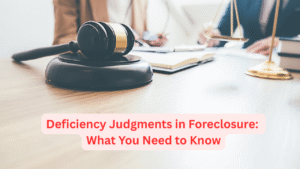 Deficiency Judgments in Foreclosure: What You Need to Know
Deficiency Judgments in Foreclosure: What You Need to Know
When a home is foreclosed and sold for less than the outstanding mortgage balance, the lender may pursue a deficiency judgment to recover the remaining debt. This legal ruling can have serious financial consequences for homeowners, even after losing their property. Here’s what you need to understand about deficiency judgments—how they work, why they happen, and how to protect yourself.
What Is a Deficiency Judgment?
A deficiency judgment is a court order that allows a lender to collect the difference between:
The foreclosure sale price of the home
The remaining mortgage balance (including fees, interest, and legal costs)
For example:
Mortgage debt: $300,000
Foreclosure sale price: $220,000
Deficiency: $80,000 (which the lender can legally pursue)
Why Do Lenders Seek Deficiency Judgments?
Lenders don’t always pursue deficiencies, but they may if:
State law allows it (some states prohibit or limit deficiency judgments).
The borrower has other assets (savings, investments, or income).
The mortgage was a refinance or investment loan (lenders are more aggressive).
How a Deficiency Judgment Affects You
If granted, the lender can:
Garnish wages
Freeze bank accounts
Place liens on other property
Damage credit for years
Unlike foreclosure, which stays on your credit report for 7 years, a deficiency judgment can haunt you much longer—sometimes 10-20 years, depending on state laws.
Pros and Cons of Deficiency Judgments
✅ Pros (For Lenders)
Recoups losses from unpaid loans
Encourages borrowers to negotiate alternatives (short sales, loan modifications)
❌ Cons (For Borrowers)
Financial ruin – Even after losing a home, you could owe tens of thousands.
Limited protections – Not all states have anti-deficiency laws.
Long-term consequences – Debt collectors can pursue you for years.
How to Avoid or Fight a Deficiency Judgment
1. Check State Laws – Some states (like California and Arizona) limit or ban deficiency judgments for primary homes.
2. Negotiate a Short Sale – Lenders may waive the deficiency if you sell before foreclosure.
3. File for Bankruptcy – Chapter 7 or 13 can eliminate or restructure the debt.
4. Challenge the Judgment – If the foreclosure sale price was unfairly low, you may dispute it in court.
Final Thoughts
A deficiency judgment can turn foreclosure into a double financial disaster—losing your home and owing a massive debt. If you’re facing foreclosure, consult a foreclosure attorney immediately to explore your best defense strategies.
Need help? Contact a HUD-approved housing counselor or legal aid organization in your area.